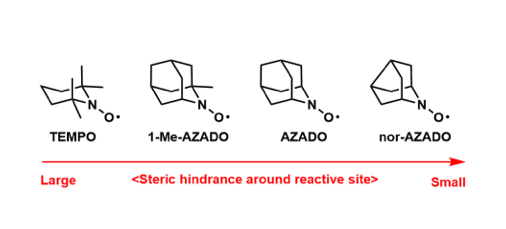- Generality
- Reagent Availability
- Experimental User Friendliness
- Criteria #4
- Criteria #5
-
General Characteristics
Alkylated hydroxylamines are easily oxidized by oxygen in the air. When there is a proton on the carbon α to the nitrogen, hydroxylamines are oxidized to nitrones. However, when the α carbons are quaternary or the double bond of nitrones would be anti-Bredt (bridgehead), the partially oxidized nitroxyl radicals can exist as stable compounds. These nitroxyl radicals are known to catalyze oxidation reactions.
TEMPO has long been used as an effective oxidation catalyst. In the 2000’s, AZADO and related catalysts were introduced by Iwabuchi. The AZADO catalysts are designed such that the active site is sterically less congested, and they have been demonstrated to be highly active and widely applicable.
It has also been reported recently that the combined use of these catalysts and either copper or iron cocatalysts can promote selective aerobic oxidation reactions.
-
General References
<AZADO & Me-AZADO>
- Shibuya, M.; Tomizawa, M.; Suzuki, I.; Iwabuchi, Y. J. Am. Chem. Soc. 2006, 128, 8412. DOI: 10.1021/ja0620336
<ABNO>
- Shibuya, M.; Tomizawa, M.; Sasano, Y.; Iwabuchi, Y. J. Org. Chem. 2009, 74, 4619. DOI: 10.1021/jo900486w
<keto-ABNO>
- Sonobe, T.; Oisaki, K.; Kanai, M. Chem. Sci. 2012, 3, 3249. DOI: 10.1039/C2SC20699D
<nor-AZADO>
- Hayashi, M.; Sasano, Y.; Nagawsawa, S.; Shibuya, M.; Iwabuchi, Y. Chem. Pharm. Bull. 2011, 59, 1570. doi:10.1248/cpb.59.1570
<reviews>
- 澁谷正俊, 岩淵好治 有機合成化学協会誌 2013, 71, 515. doi:10.5059/yukigoseikyokaishi.71.515
- Iwabuchi, Y. Chem. Pharm. Bull. 2013, 61, 1197. doi:10.1248/cpb.c13-00456
-
Reaction Mechanism
See the page for TEMPO oxidation for the basic mechanistic explanation.
The redox potential of nitroxyl radical compounds (and their reactivity towards oxidation) can be tuned by modifying their structures. (Ref: Tetrahedron Lett. 2012, 53, 2070.)

Figure: Extracted from ACS Catal. 2013, 3, 2612.
-
Examples
The oxidation of sterically hindered hydroxyl groups.[1] 
The oxidation of alcohols all the way to carboxylic acids using chlorite as the stoichiometric oxidant.[2] 
Aerobic oxidation is possible in the presence of NOx.[3] 
Even a chiral catalyst capable of highly selective kinetic resolution has been developed.[4] 
An example of oxidation of fluorinated alcohols under mild conditions.[5] 
An example from the total synthesis of taiwaniadducts.[6] 
The synthesis of sphingofungin E[7]: The oxidation at a difficult position was achieved by using cyanohydrin. 
A high yielding example from the synthesis of (-)-acetylaranotin.[8] 
-
Experimental Procedure
-
Experimental Tips
-
References
- Shibuya, M.; Tomizawa, M.; Suzuki, I.; Iwabuchi, Y. J. Am. Chem. Soc. 2006, 128, 8412. DOI: 10.1021/ja0620336
- Shibuya, M.; Sato, T.; Tomizawa, M.; Iwabuchi, Y. Chem. Commun. 2009, 1739. DOI: 10.1039/B822944A
- (a) Shibuya, M.; Osada, Y.; Sasano, Y.; Tomizawa, M.; Iwabuchi, Y. J. Am. Chem. Soc. 2011, 133, 6497. doi:10.1021/ja110940c (b) Liu, R.; Liang, X.; Dong, C.; Hu, X. J. Am. Chem. Soc. 2004, 126, 4112. DOI: 10.1021/ja031765k (c) Lauber, M. B.; Stahl, S. S. ACS Catal. 2013, 3, 2612. DOI: 10.1021/cs400746m
- Murakami, K.; Sasano, Y.; Tomizawa, M.; Shibuya, M.; Kwon, E.; Iwabuchi, Y. J. Am. Chem. Soc. 2014, 136, 17591. DOI: 10.1021/ja509766f
- Kadoh, Y.; Tashiro, M.; Oisaki, K.; Kanai, M. Adv. Synth. Catal. 2015, DOI: 10.1002/adsc.201500131
- Deng, J.; Zhou, S.; Zhang, W.l Li, J.; Li, R.; Li, A. J. Am. Chem. Soc. 2014, 136, 8185. DOI: 10.1021/ja503972p
- Ikeuchi, K.; Hayashi, M.; Yamamoto, T.; Inai, M.; Asakawa, T.; Hamashima, Y.; Kan, T. Eur. J. Org. Chem. 2013, 30, 6789. DOI: 10.1002/ejoc.201301065
- Fujiwara, H.; Kurogi, T.; Okaya, S.; Okano, K.; Tokuyama, H. Angew. Chem. Int. Ed. 2012, 51, 13062. DOI: 10.1002/anie.201207307
-
Related Reactions
-
Related Books
[amazonjs asin=”0198556640″ locale=”US” title=”Oxidation and Reduction in Organic Synthesis (Oxford Chemistry Primers)”]
[amazonjs asin=”3527323201″ locale=”US” title=”Modern Oxidation Methods”]
[amazonjs asin=”B000WLMZV4″ locale=”US” title=”Oxidation of Alcohols to Aldehydes and Ketones (Basic Reactions in Organic Synthesis)”]
-
External Links
- AZADO (organic-chemistry.org)
- ABNO (organic-chemistry.org)
- nor-AZADO (organic-chemistry.org)
- 東北大学大学院 岩淵好治研究室 (The Iwabuchi Lab at Tohoku University)

